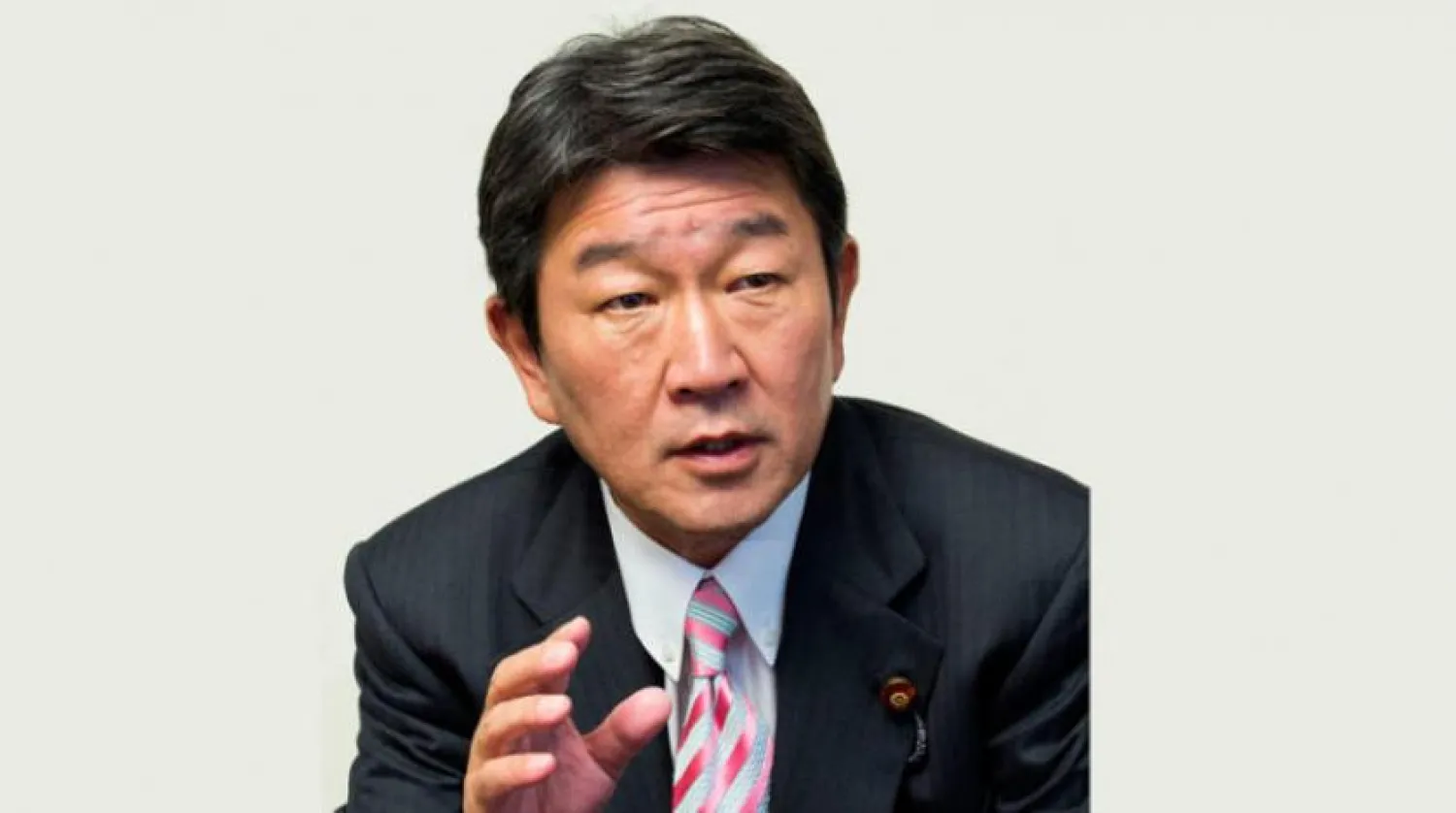In an exclusive interview with Asharq Al-Awsat, Japanese Foreign Minister Toshimitsu Motegi said that Saudi Arabia “is not only the cornerstone of stability in the Middle East but also an important partner for us for energy security in Japan,” noting that Tokyo will continue to “make further progress” in the strategic partnership between the two countries.
On Sunday, Motegi will kick-start from Egypt a Middle East tour that includes seven countries. The trip will continue until Aug. 24.
The visit aims to renew the commitment of “Japan, which has established strong relations with the countries of the Middle East for several years, to peace and prosperity in the region, and the importance of the international system based on the rule of law,” according to a statement.
“We plan to discuss cooperation for regional stability,” the minister told Asharq Al-Awsat, adding that he would review a series of topics with the aim of “developing a unique and special diplomacy in Japan, based on the old and well-established friendship.”
Motegi noted that Japan was making efforts with Iran, which is included in his visit, to urge Tehran to “reduce tensions and work to stabilize the situation” in the Middle East, pointing to six conversations he held with former Iranian Foreign Minister Mohammad Javad Zarif directly and over the phone.
Asked about the Japanese policy towards the Middle East, he said: “The Middle East is an important region for Japan for energy security, and we have established good relations with it over many years through various cooperation. And now, I have come to visit the region with the intent of developing unique and special diplomacy for Japan, building on the long-standing and well-established friendship.”
On the peace process between the Israelis and Palestinians, the Japanese foreign minister replied: “I will first talk about peace in the Middle East. Jerusalem is a place where various religious and ethnic conflicts have persisted throughout history and never ceased, and this was also due to the various conflicts between countries outside the region. I am sure that there are efforts to build confidence that can only be achieved through Japan, which has no such negative historical legacy. An example is the ‘Peace and Prosperity Corridor’ initiative, which Japan is promoting in cooperation with Israel and Jordan, as an original and exclusive initiative of its own.”
He continued: “The main project of this initiative, the Jericho Agricultural Industrial City Project (JAIP), supports the robust development of the self-reliant Palestinian economy, by increasing employment opportunities for Palestinians.”
On Syrian, Motegi expressed concern over the stagnant situation in the country.
He emphasized the need to re-establish diplomatic efforts based on dialogue and cooperation, saying that during this visit to the Middle East, he would exchange views with Arab countries and discuss ways to improve the situation in Syria, and thus the stability of the entire region.
On what can Japan offer to connect the countries of the region, the senior official said his country would vigorously promote diplomacy that only Japan can carry out based on the trust gained in the countries of the Middle East.
“I think that the most important thing at present when these major powers and emerging powers are competing with each other, is not trying to impose the specific viewpoint through power, but rather seeking ways to find solutions according to the rules of the international community, and also through the creation of new rules that respond to various changes such as economic, social and technological innovation,” Motegi said, in response to a question about the future of international forces in the Middle East.
Regarding his opinion on the Japanese relations with the Gulf States, in particular Saudi Arabia, the foreign minister said that Japan has established good relations with the countries of the Gulf Cooperation Council, noting that the Kingdom, which plays an important role in the G20, “is not only a cornerstone of stability in the Middle East but also an important partner for us for energy security in Japan.”
“Japan supports the non-dependence on oil, industrial diversification, and economic and social reforms promoted by the Kingdom of Saudi Arabia within the framework of the Japan-Saudi Vision 2030 […]. We will continue our efforts to achieve further progress in the strategic partnership between the two countries in broad fields,” he underlined.
On the role that Japan could play with Iran, Motegi stressed that his country could openly exchange views with Iran by taking advantage of their long-standing and traditional friendship.
“For example, when former Japanese Prime Minister Shinzo Abe visited Iran during the heightened tensions in the Middle East, he directly urged Supreme Leader Ali Khamenei to ease tensions and stabilize the situation. Since then, mutual communication continues at the level of leaders and foreign ministers, and since I assumed my position as foreign minister, I have had 6 conversations with the Iranian foreign minister, directly and by phone,” he said.
Japan intends to cooperate closely with the concerned countries, including Saudi Arabia and Iran, to actively contribute to easing tensions and stabilizing the situation in the Middle East, taking advantage of its unique and special position, the minister concluded.










